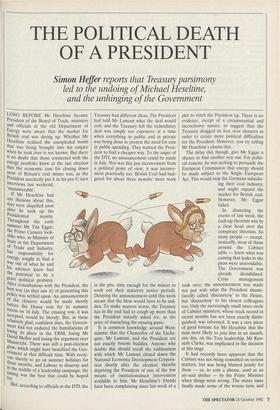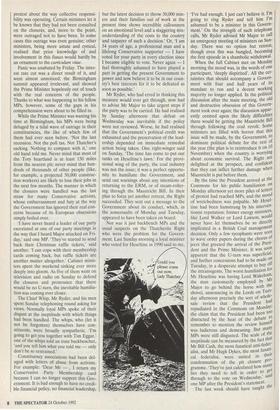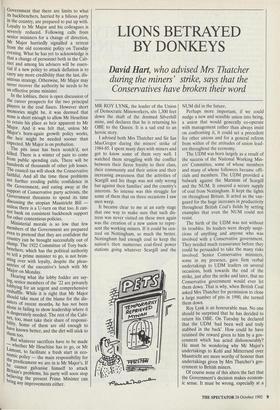THE POLITICAL DEATH OF A PRESIDENT
Simon Heifer reports that Treaswy parsimony
led to the undoing of Michael Heseltine, and the unhinging of the Government
LONG BEFORE Mr Heseltine became President of the Board of Trade, ministers and officials at the old Department of Energy were aware that the market for British coal was drying up. Whether Mr Heseltine realised the unexploded bomb that was being brought into his empire When he took over is not known. But there IS no doubt that those connected with the energy portfolio knew at the last election that the economic case for closing down most of Britain's coal mines was, as the !resident succinctly put it in his pre-U-turn interviews last weekend, unanswerable'.
If Mr Heseltine had any illusions about this, they were dispelled soon after he took up the Presidential mantle. Throughout the early summer Mr Tim Eggar, the Primo Camera look- alike who, as Minister of State at the Department Of Trade and Industry, has responsibility for energy, sought to find a
• ■■'), out of what he and his advisers knew had the potential to be a grave political problem. After consultations with the President, the best way (as they saw it) of presenting this Policy was settled upon. An announcement of the closures would be made shortly before the House rose for its summer recess on 16 July. The ensuing row, it was accepted, would be bloody. But, in those relatively glad, confident days, the Govern- ment had not endured the humiliations of losing its place in the ERM, losing Mr David Mellor and losing the argument over Maastricht. There was still a post-election glow, which might have benefited the Gov- ernment at that difficult time. With every- one shortly to go on summer holidays for three months, and Labour in disarray and tin the middle of a leadership campaign, the
'ming was the best that could be hoped for.
But, according to officials at the DTI, the Treasury had different ideas. The President had told Mr Lamont what the deal would cost, and the Treasury felt the redundancy deal was simply too expensive at a time when everything in public and in private was being done to protest the need for cuts in public spending. They wanted the Presi- dent to find a cheaper way. To the anger of the DTI, no announcement could be made in July. Nor was this just inconvenient from a political point of view; it was inconve- nient practically too. British Coal had bud- geted for about three months' more work in the pits, time enough for the miners to work out their statutory notice periods. Delaying the announcement until this week meant that the blow would have to be sud- den. To make matters worse, the Treasury has in the end had to cough up more than the President initially asked for, as the price of staunching the ensuing panic.
It is common knowledge around West- minster that the Chancellor of the Exche- quer, Mr Lamont, and the President are not exactly bosom buddies. Anyone who doubts this should recall the ruthlessness with which Mr Lamont closed down the National Economic Development Corpora- tion shortly after the election, thereby depriving the President of one of the few means of institutionalised intervention available to him. Mr Heseltine's friends have been complaining since last week of a plot to stitch the President up. There is no evidence, except of a circumstantial and inconclusive nature, to suggest that the Treasury dragged its feet over closures in order to create more political difficulties for the President. However, you try telling Mr Heseltine's chums that.
The delay did, though, give Mr Eggar a chance to find another way out. For politi- cal reasons, he was seeking to persuade the European Commission that energy should be made subject to the Single European Act. This would stop the Germans subsidis- ing their coal industry, and might expand the market for British coal. However, Mr Eggar failed.
In dissecting the events of last week, the cock-up theorists win by a clear head over the conspiracy theorists. So many people — except, ironically, most of those around the Cabinet table — knew what was coming that leaks to the press were unavoidable.
The Government was already destabilised.
Crisis management took over; the announcement was made not just with what the President shame- facedly called 'discourtesy' to the House, but 'discourtesy' to his closest colleagues too. Only the increasingly small inner circle of Cabinet ministers, whose track record in recent months has not been exactly distin- guished, was informed. It was a rare piece of good fortune for Mr Heseltine that the man most likely to join him in an assault, one day, on the Tory leadership, Mr Ken- neth Clarke, was implicated in the decision at this stage.
It had recently been apparent that the Cabinet was not being consulted on serious matters, but was being blamed jointly for them — or, to coin a phrase, used as an air-raid shelter — by the Prime Minister when things went wrong. The mines issue finally made some of the worms turn, and protest about the way collective responsi- bility was operating. Certain ministers let it be known that they had not been consulted on the closures, and, more to the point, were outraged not to have been. In some cases this outrage was even genuine; other ministers, being more astute and cynical, realised that prior knowledge of and involvement in this fiasco would hardly be an ornament to the curriculum vitae.
Panic was unabated by Friday. The inter- est rate cut was a direct result of it, and went almost unnoticed; the Birmingham summit appeared irrelevant, and showed the Prime Minister hopelessly out of touch with the real concerns of the people. Thanks to what was happening to his fellow MPs, however, some of the gaps in his comprehension were about to be filled in.
While the Prime Minister was wasting his time at Birmingham, his MPs were being deluged by a tidal wave of outrage in their constituencies, the like of which few of them had ever seen before. 'Not the last recession. Not the poll tax. Not Thatcher's sacking. Nothing to compare with it,' one old hand told me. Never mind that most of the Tory heartland is at least 150 miles from the nearest pit; never mind that hun- dreds of thousands of other people (like, for example, a projected 50,000 construc- tion workers) are likely to lose their jobs in the next few months. The manner in which the closures were handled was the last straw for many Conservative activists, whose embarrassment and fury at the way the Government has ignored their real con- cerns because of its European obsessions simply boiled over.
'I have never heard a leader of our party excoriated at one of our party meetings in the way that I heard Major attacked on Fri- day,' said one MP. 'They've started to send back their Christmas raffle tickets,' said another. 'I can cope with their membership cards coming back, but raffle tickets are another matter altogether.' Cabinet minis- ters spent the weekend sinking ever more deeply into gloom. As five of them went on television and radio on Sunday to defend the closures and pronounce that there would be no U-turn, the inevitable humilia- tion was coming ever closer.
The Chief Whip, Mr Ryder, and his men spent Sunday telephoning round asking for views. Normally loyal MPs spoke of their disgust at the ineptitude with which things had been handled. The whips, who (let it not be forgotten) themselves have con- stituents, were broadly sympathetic. 'I'm going to get you together with Tim Eggar,' one of the whips told an irate backbencher, 'and you tell him what you told me — only don't be so restrained.'
Constituency associations had been del- uged with letters of abuse from activists. For example: 'Dear Mr — , I return my Conservative Party Membership card because I can no longer support this Gov- ernment. It is bad enough to have no credi- ble financial policy, no financial leadership, but the latest decision to throw 30,000 min- ers and their families out of work at the present time shows incredible callousness on an emotional level and a staggering mis- understanding of the costs to the country and taxpayer of such a decision.' Or, 'I am 54 years of age, a professional man and a lifelong Conservative supporter — I have voted for your party in every election since I became eligible to vote. Never again — I feel thoroughly ashamed to have played a part in getting the present Government to power and now believe it to be in our coun- try's best interests for it to be defeated as soon as possible.'
Mr Ryder, who had erred in thinking this measure would ever get through, now had to advise Mr Major to take urgent steps if the party was to be carried. He had realised by Sunday afternoon that defeat on Wednesday was inevitable if the policy were not reviewed. Worse, he had realised that the Government's political credit was exhausted and the preservation of the lead- ership depended on immediate remedial action being taken. One right-winger said on Sunday, 'The time has come to put our tanks on Heseltine's lawn.' For the provi- sional wing of the party, the coal industry was not the issue; it was a perfect opportu- nity to humiliate the Government, and send out warnings about any intentions of returning to the ERM, or of steam-roller- ing through the Maastricht Bill. In their plan to force yet another retreat, the Right succeeded. They sent out a message to the Government about its conduct, which, in the somersaults of Monday and Tuesday, appeared to have been taken on board.
Nor was it just backbench MPs and the usual suspects on the Thatcherite Right who were the problem for the Govern- ment. Last Sunday morning a loyal minister who voted for Heseltine in 1990 said to me,
'I've had enough. I just can't believe it. I'm going to ring Ryder and tell him I'm ashamed to be a minister in this Govern- ment.' On the strength of such telephone calls, Mr Ryder advised Mr Major to call an emergency meeting of ministers on Sun- day. There was no option but retreat, though even this was bungled, becoming the first episode in a shambolic withdrawal. When the full Cabinet met on Monday morning the mood was, in the words of one participant, 'deeply dispirited'. All the cer- tainties that should accompany a Govern- ment with four and half years of its mandate to run and a decent working majority no longer applied. In the political discussion after the main meeting, the old and destructive obsession of this Govern- ment took over again; the discussion appar- ently centred upon the likely difficulties there would be getting the Maastricht Bill through following the coal revolt. Some ministers are filled with horror that this issue will be made, by the Government, to dominate political debate for the rest of the year (the plan is to reintroduce it on 10 November) when the country is worrying about economic survival. The Right are delighted at the prospect, and confident that they can inflict further damage when Maastricht is put before them. By the time the President arrived at the Commons for his public humiliation on Monday afternoon yet more piles of letters of protest had reached MPs, and the mood of wretchedness was palpable. Mr Hesel- tine had been hamstrung by his interven- tionist reputation; former energy ministers, like Lord Walker or Lord Lawson, would never have let themselves be so directly implicated in a British Coal management decision. Only a few sycophants were seen to wave order papers during the chorus of jeers that greeted the arrival of the Presi- dent and the Prime Minister. It was soon apparent that the U-turn was superficial, and further concessions had to be made on Tuesday, in a desperate attempt to buy off the intransigents. The worst humiliation for Mr Heseltine was having Lord Wakeham, the man customarily employed by Mr Major to go behind the horse with the shovel, announcing in the Lords on Tues- day afternoon precisely the sort of whole- sale review that the President had repudiated in the Commons on MondaY, the claim that the President had been too distracted by the heat of the debate to remember to mention the review himself was ludicrous and demeaning. But many MPs were still disgusted. The scale of the ineptitude can be measured by the fact that Mr Bill Cash, the most fanatical anti-feder.- alist, and Mr Hugh Dykes, the most fanao- cal federalist, were united in their condemnation of the pit closure Pro- gramme. 'They've just calculated how manY lies they need to tell in order to ge.Ar through to the vote on Wednesday, sal one MP after the President's statement.
The last week should have taught the Government that there are limits to what its backbenchers, harried by a bilious party in the country, are prepared to put up with. Loyalty to Mr Major and his colleagues is severely reduced. Following calls from senior ministers for a change of direction, Mr Major hurriedly signalled a retreat from the old economic policy on Tuesday evening. What he has yet to acknowledge is that a change of personnel both in the Cab- inet and among his advisers will be essen- tial if a new policy to attack deflation is to carry any more credibility than the last, dis- astrous strategy. Otherwise, Mr Major may never recover the authority he needs to be an effective prime minister. In the lobbies, there is open discussion of the career prospects for the two principal players in the coal fiasco. However short memories might be, it was deemed that none is short enough to allow Mr Heseltine to retain his place as heir apparent to Mr Major. And it was felt that, unless Mr Major's born-again growth policy works, the heir might be needed sooner than expected. Mr Major is on probation. The pits issue has been scotch'd, not killed. There is a winter of pain to come from public spending cuts. There will be hundreds of thousands of other job losses. The council tax will shock the Conservative faithful. And all the time these problems are further eroding public confidence in the Government, and eating away at the support of Conservative party activists, the Government threatens to spend its time discussing the utopian Maastricht Bill — unless there is a U-turn on that too. It can- not bank on consistent backbench support for other contentious policies.
Ministerial morale is so low that few members of the Government are prepared even to pretend that they are confident the country can be brought successfully out of slump. The 1922 Committee of Tory back- benchers, which has the political authority to. tell a prime minister to go, is not brim- ruing over with loyalty, despite the pleas- antries of the executive's lunch with Mr Major on Monday. • Hearing what the lobby fodder are say- mg, senior members of the '22 are privately lobbying for an urgent and comprehensive reshuffle. While it is right that Mr Major should take most of the blame for the dis- asters of recent months, he has not been alone in failing to show leadership where it Is desperately needed. The rest of the Cabi- net, too, must take their share of responsi- :!inty. Some of them are old enough to nave known better, and the dirt will stick to them too.
But whatever sacrifices have to be made whether Mr Heseltine has to go, or Mr Lamont, to facilitate a fresh start in eco- ,notnic policy — the main responsibility for !Ile predicament we are in is Mr Major's. If n_e. cannot galvanise himself to attack ,birita problems, his party will soon stop ,oelieving the present Prime Minister can °ring any improvements either.




































































 Previous page
Previous page